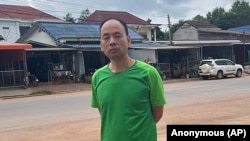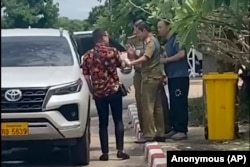Zhang Chunxiao, the wife of Chinese rights lawyer Lu Siwei, is calling for the release of her husband, who was arrested in Laos Friday morning while boarding a train for Thailand.
Zhang told VOA Mandarin on Monday that Lu had been transferred from a local Vientiane immigration office to Laos' national immigration department.
She said in Lu's last message to her on Friday night, he said three police officers were with him to take him away, and he might not be able to message her again.
Peter Dahlin, the founder of the nongovernmental organization, Safeguard Defenders, confirmed to VOA Mandarin in an email that Lu has been taken to the immigration department's main office near the airport in Vientiane Monday morning, Laos time.
"This shows that they are planning to process his deportation today, and one local source tells us Chinese embassy personnel are on-site as well. It may happen very soon, as it appears imminent unless pressure from other governments makes the Laotian government reconsider," he said.
"His deportation will make them violate both their legally binding commitment under the U.N. Convention Against Torture, but also the general principle of non-refoulment, that is, to not send people back if they stand a risk of torture or maltreatment," he added.
According to the Safeguard Defenders website, Lu held a valid visa for Laos when he crossed into the country earlier this month.
"He planned to travel by train to Thailand along the route that starts at Thanaleng Station, southeast of the capital, Vientiane. The station is a short distance from the Thai-Laotian Friendship Bridge. Lu planned to fly from Thailand to the US to reunite with his wife and daughter" according to the site.
Forced into car
Two friends from North America were with Lu in Laos.
The trio had arrived at the station around 8:35 a.m. to buy tickets for the 10 a.m. train on July 28, when local police confiscated the passports of Lu and one of the others, according to the NGO's website.
Police returned and handcuffed Lu, the site said. One of Lu's companions said that about 10 immigration police were involved in the incident that ended with Lu being forced into a car and taken away.
"As in China, the railways have their own separate police force. It is unclear if Lu is now being held at a railway police detention centre or is already at the immigration detention centre at the airport," according to the site.
Laos maintains an extradition treaty with China but in the past "all known cases of Chinese nationals returned to China have been conducted under illegal or irregular operations … or by having the Laotian government order their deportation," to China, according to Safeguard Defenders.
VOA Mandarin contacted the Lao and Chinese embassies in Washington for comment. The Lao embassy did not respond. In an email, the Chinese embassy said "Unfortunately, we do not have anything to offer" on the reasons for Lu's arrest or what's going to happen to him next.
The countries maintain a close relationship.
On April 17, China's Wang Yi, now the foreign minister, met with Saleumxay Kommasith, deputy prime minister and minister of foreign affairs of Laos.
Wang said, "China and Laos are friendly neighbors linked by mountains and rivers. Bilateral relations have stood the test of changing international situation and even wars and are rock-solid and unshakable."
Saleumxay Kommasith said, "The Lao people wholeheartedly appreciate the strong support and selfless help of the CPC, the Chinese government and the Chinese people. Laos is ready to work with China to strengthen exchanges and cooperation."
Lawyer took on sensitive cases
Lu had a history of taking on sensitive cases and defending people seen as political targets by Chinese authorities.
He represented 12 Hong Kong residents, the so-called Hong Kong 12, after they were intercepted at sea by Chinese authorities as they tried to flee to Taiwan on August 23, 2020
China revoked Lu's license to practice law in January 2021. Two months later, he was banned from leaving China.
Dahlin said Lu "will certainly be detained upon his return, possibly also for crossing the Chinese border illegally. Upon detention, his fate is, of course, sealed, and it's unlikely that he will not be arrested, prosecuted, brought to trial and convicted."
Zhang said international society, including the U.N. and U.S., are pressuring Laos for Lu's release.
In a social media video, she said, "If repatriated to China, my husband will be tortured and detained. I plea to the Laotian government to allow him to be protected by the U.N. as an international refugee."
She hopes to reunite with Lu soon because their daughter hasn't seen her father for almost two years.
VOA contacted the State Department for updates on Lu's case but didn't get a response by the time of publication.
Dahlin, of Safeguard Defenders, said, "The Laotian government must be made aware that blatant violation of international law, as this is, and doing the bidding of a foreign police state, that is, China, will come with consequences, and Lu, of course, must be released, and allowed to continue his travel, and ultimately, reunite with his wife and kid."






